#Kátia Lund
Explore tagged Tumblr posts
Text

City of God (Cidade de Deus) - 2002 - Dir. Fernando Meirelles and Kátia Lund
"15 miles from paradise... one man will do anything to tell the world everything."
#t shirt#movie#city of god#aat#and after that#cidade de deus#portuguese#rio de janeiro#city of god 2002#Fernando Meirelles#Kátia Lund#Alexandre Rodrigues#Alice Braga#Douglas Silva#Phellipe Haagensen#Darlan Cunha#Leandro Firmino#Jonathan Haagensen#Seu Jorge#Paulo Lins#Roberta Rodrigues#Rubens Sabino#Renato de Souza#Graziella Moretto#Daniel Zettel#City of God (Cidade de Deus) - 2002 - Dir. Fernando Meirelles and Kátia Lund#“15 miles from paradise... one man will do anything to tell the world everything.”
46 notes
·
View notes
Text


Cidade de Deus, 2002
#crime#drama#cidade de deus#city of god#fernando meirelles#kátia lund#paulo lins#bráulio mantovani#douglas silva#resourcefulness
14 notes
·
View notes
Text











Film & TV I Think About A Lot » City of God / Cidade de Deus (2002) dir. Fernando Meirelles & Kátia Lund
Sun is for everyone, beach for a few.
#just good storytelling (as if its never been said before lmao literally frequently listed as one of the greatest films of all time)#the way the color grading in this movie is set up is so wonderful it just gradients from cool to warm to cool like a loop#cftv#mygifs#cgedits#fyeahmovies#moviegifs#black#blackinfilm#blackinmotionpictures#black cinema#movies#films#filmgifs#cinema#userfilm#brazil#brazilian film#city of god#city of god 2002#cidade de deus
82 notes
·
View notes
Text
How Lil Z and Benny's Relationship Held a Lot of Romantic Undertones (IMO)
City of God is a criminal drama film from Brazil that was directed by Kátia Lund and Fernando Meirelles. It centers on the lives of a number of people living in Rio de Janeiro's slums, with special attention paid to Rocket, a young child who aspires to be a photographer. The brutal turf conflicts between gangs and the emergence of organized crime in the slum are depicted in the movie.
The story spans across several years as it tells the tale of how the aspiring photographer and all of the other residents living in the slums connect with one another. Rocket, even as he is actively getting out of the slums, documents everything he witnesses. Themes of the story include a lot about violence, drugs, and growing up in poverty. This movie also highlights how each generation in the city quickly repeats the cycle even after the old gangsters are gone. City of God should be well known for its irregular storytelling and gripping character interactions.

One of the most appreciated things about this story was it’s beautiful composition and color correcting. Every shot is carefully constructed and shows a clear emotion. From the vibrant and warm colors of the beach shots to the gritty and washed out shots pertaining to the cyclical drug rings. Fernando Meirelles and Kátia Lund were very attentive with how they wanted to direct this movie and they did not disappoint in the slightest.


Another major highlight of the film for me were the character interactions. My favorite dynamic throughout the film was that of Lil Z (formally known as Lil Dice) and Benny, his childhood friend.

In the beginning of the movie we’re shown that these two are inseparable. They’ve grown up in the slums together since they were both young kids and have had each other’s backs for the longest. They run a drug ring together and are basically in charge of what goes on on their turf. Lil Z’s behavior as a child can be heavily described as sociopathic. He has no problem killing innocent people and will often take things to the next level if he so desires. Benny, on the other hand, has a bit more humanity to him. He’s seen going through the city and talking with a lot of the residents there. He also makes friends with Rocket and his little group of friends. Hell, Benny is so likable that even after stealing the heart of Rocket’s crush, Rocket still remained friendly with him and even came to his going away party!

Lil Z and Benny are connected and yet kind of opposite of each other in a sense. Benny is Lil Z’s FOIL; the angelic conscience on his shoulder; the one that keeps him grounded. And maybe it’s just me but I also felt that Lil Z even felt much more than kinship for his best friend. Throughout the movie, Benny is constantly always keeping Lil Z from not making too much trouble. He keeps him in check and makes sure he doesn’t go overboard with the violence during their deals. Benny, in Lil Z’s eyes, is the only one worthy of respect and puts him on an equal level to him. Benny is the only person Lil Z ever (and will ever) need.
So imagine his surprise when Benny starts to become occupied with another woman. Insert Rocket’s crush: Angela. I won’t go too into detail on their relationship but after dating her Benny realizes he wants to leave behind this harsh life and start a new peaceful one with Angela. He could've done it as well, he had tons of money from slanging coke and was ready to settle down. This doesn’t make Lil Z the happiest. And though he never outright says he doesn’t want Benny to leave him, we see it through his behaviors and what other phrases he throws onto him.
“We’re doing so well. You can own this part of the city after we’re done!”
“You can’t just leave after making this much progress.”
"You're doing all this for some bitch?"

I’m paraphrasing a bit here, but these are similar to the lines said to Benny when confronting him about his desire to leave the city. Benny even proposes to him that he should get a girlfriend and realize why he’d want to leave. He basically proposed that if he found someone he loved enough, then he’d want to leave this life as well. I believe, however, that one of the reasons Lil Z truly enjoys this gangster lifestyle is because he’s always had Benny, his other half.
I don’t think Lil Z understood that what he felt for Benny was romantic. Benny was always prioritized in his mind along with the City, he never really left his side, and he shows a lot of distaste to his other gang members besides Benny.

I almost wished that they explored a bit more with their relationship in the movie but I also believe that it was intentionally done. From an outsider’s POV, there were heavy romantic undertones to how Lil Z felt about Benny. But from Lil Z’s POV, he didn’t truly know what love is. So how could he have known that was what he felt for Benny?
I won’t get into too many heavy spoilers so this will be my take on how their relationship is to me during the 1st and 2nd acts of the movie. Most likely to be continued.
5 notes
·
View notes
Note
47. Movies that you think everyone should watch.
• as i was moving ahead occasionally i saw brief glimpses of beauty, dir. jonas mekas [on appreciating life/moments] • la haine, dir. mathieu kassovitz [i have a line from this film tatted on the back of my neck: jusqu'ici tout va bien.] • city of god, dir. fernando meirelles & kátia lund [on resilience] • amelie, dir. jean-pierre jeunet [my feel good movie] • before sunrise / before sunset / before midnight, dir. richard linklater [on love, marriage and connection] • no country for old men, dir. joel & ethan coen [on morality & fate vs. free will] • apocalypse now, dir. francis ford coppola [just because it's fucking amazing and the reason i became a cinephile or whatever] • there will be blood, dir. paul thomas anderson [on greed, religion & capitalism]
also, not a movie, but i think everyone should watch the sopranos
thank you for asking. what about you?
5 notes
·
View notes
Text

City of God (Fernando Meirelles/Kátia Lund, Brazil, 2003)
2 notes
·
View notes
Text

City of God (2002)
Directors: Fernando Meirelles, Kátia Lund
3 notes
·
View notes
Text

City of God, dir. Fernando Meirelles & Kátia Lund
4 notes
·
View notes
Text

City of God (2002)
Directors: Fernando Meirelles, Kátia Lund
3 notes
·
View notes
Text
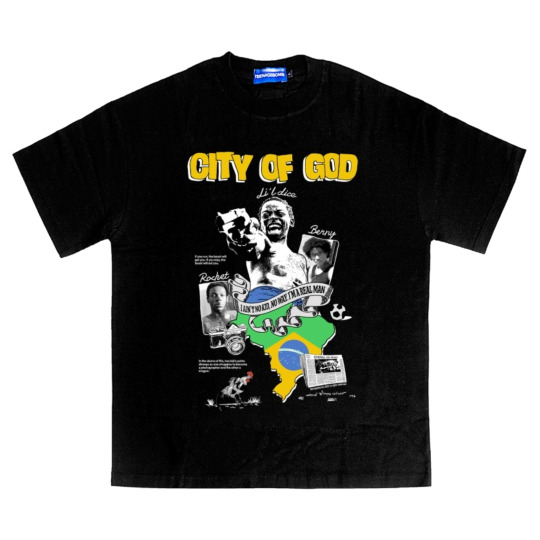
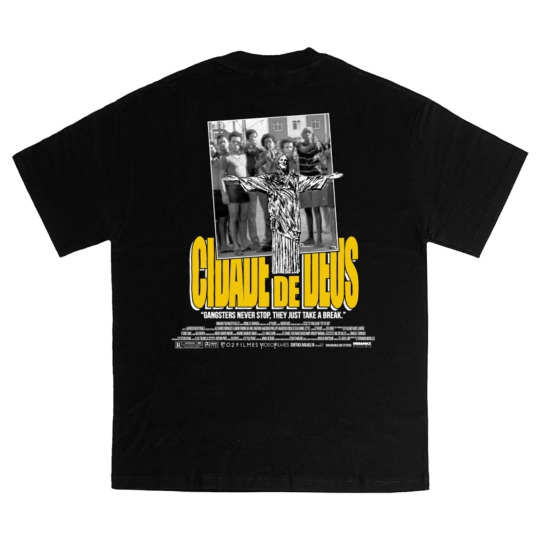
City of God (Cidade de Deus) - 2002 - Dir. Fernando Meirelles and Kátia Lund
"Gangsters never stop. They just take a break."
#t shirt#black#movie#city of god#teenagebomb#cidade de deus#portuguese#rio de janeiro#city of god 2002#Fernando Meirelles#Kátia Lund#Alexandre Rodrigues#Alice Braga#Douglas Silva#Phellipe Haagensen#Darlan Cunha#Leandro Firmino#Jonathan Haagensen#Seu Jorge#Paulo Lins#Roberta Rodrigues#Rubens Sabino#Renato de Souza#Graziella Moretto#Daniel Zettel#City of God (Cidade de Deus) - 2002 - Dir. Fernando Meirelles and Kátia Lund#“Gangsters never stop. They just take a break.”
2 notes
·
View notes
Text
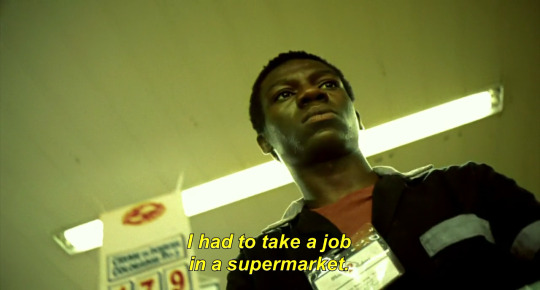
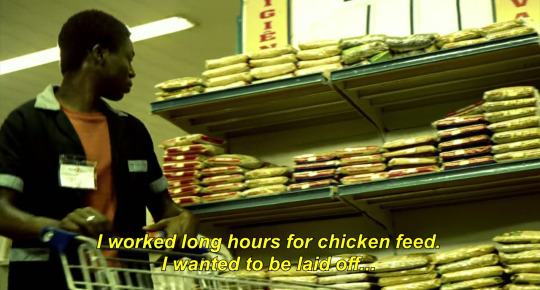
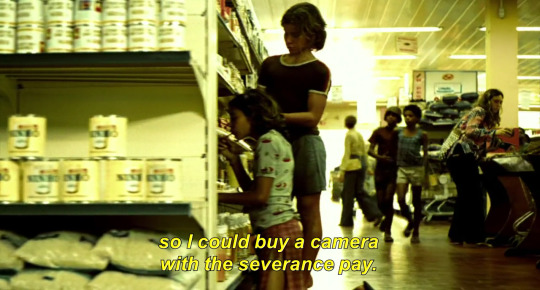
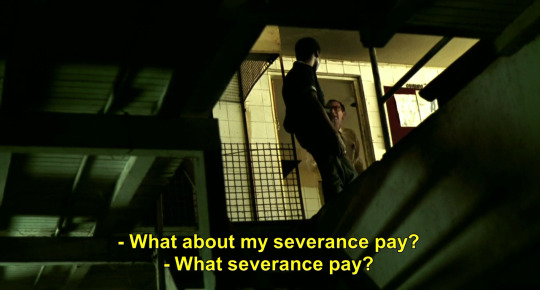
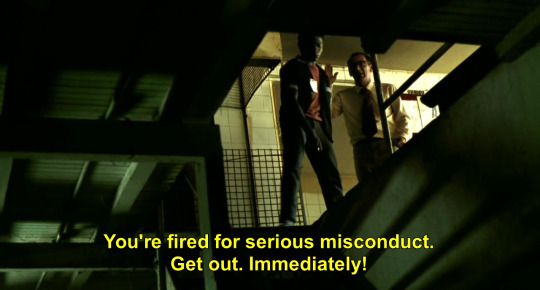
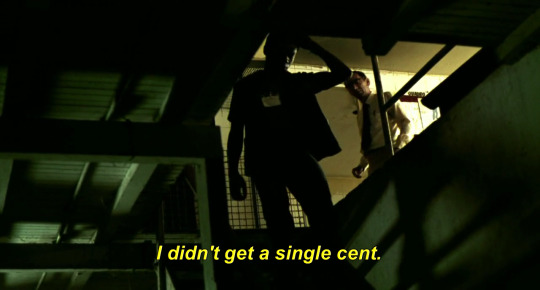
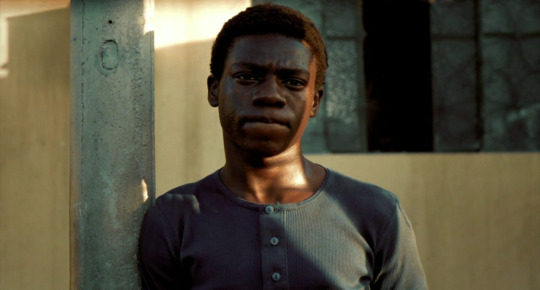
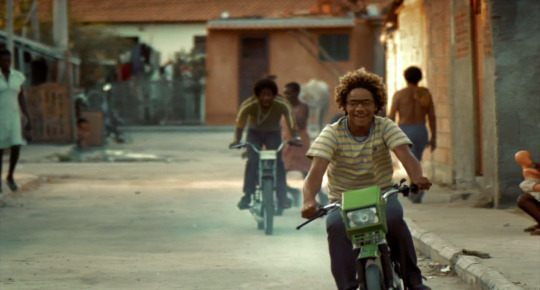
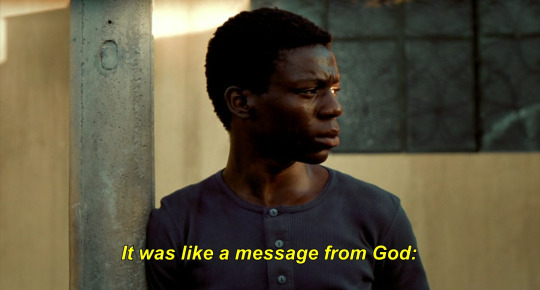
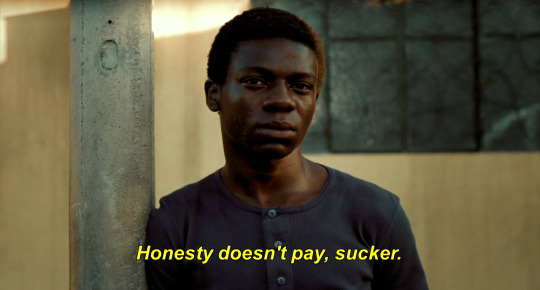
Cidade de Deus, 2002
#crime#drama#cidade de deus#city of god#fernando meirelles#kátia lund#paulo lins#bráulio mantovani#alexandre rodrigues#leandro firmino#phellipe haagensen#guti fraga#morality
76 notes
·
View notes
Text

city of god (2002) dir. fernando meirelles & kátia lund
0 notes
Text
Korbin Massie
City of God
World Cinema
Analytical Review of City of God
City of God (2002), directed by Fernando Meirelles and Kátia Lund, dives deeply into themes of poverty, violence, and survival within Rio de Janeiro. Adapted from Paulo Lins's autobiographical novel, the film sheds light on the challenging and often harsh lives of different individuals caught in cycles of crime, economic problems, and social neglect. Although centered on gang rivalries and drug wars, *City of God* goes beyond typical crime drama, critiquing systematic inequality and showing how environments lacking structural support lead people down paths marked by violence, limited opportunity, and the pursuit of power.
One of City of God's standout elements is its nonlinear structure and layered perspective. The story is narrated by Rocket, a young photographer whose detached viewpoint offers insight into the issues of the city. His narration shows flashbacks and present-day events, offering a view into the characters’ pasts and showing how power dynamics change over time.
Rocket’s role as narrator adds a layer of complexity. Growing up in the city, he is both an insider to its struggles and an outsider in his desire to escape through photography. His detachment from the violence, both a way of coping and a product of his artistic aspirations, encourages viewers to assess the unfolding events. Unlike the gang members who seek control through violence, Rocket’s pursuit of a different life path shows a personal struggle for identity that extends beyond the city’s borders.
The film’s style is visually striking, creating an experience that feels both documentary-like and cinematically intense. César Charlone uses handheld shots, quick pans, and close-ups to capture the energy and unpredictability of life in the slums, aligning with the directors’ commitment to realism. The choice to cast non-professional actors, many from similar backgrounds, further enhances the story's authenticity, giving the characters a real, grounded feel instead of making them seem unauthentic.
The use of color and lighting is also significant. Gritty, sun-soaked visuals emphasize the intense heat and crowded nature of the slums, while faded, dusty hues evoke a sense of evil and hopelessness. Occasional bright colors fill certain scenes, highlighting the cultural vibrancy of the city despite its harsh conditions. This visual style isn’t just for aesthetic effect, it serves as a commentary on the comparison of beauty and brutality that defines life there.
The film’s themes revolve around survival, power, and the brutal cycle of violence that clings to its characters. The city functions as an isolated ecosystem where government and social services are nearly absent, leaving crime as a primary survival mechanism and power gained through violence. Characters like Lil Ze and Benny represent different approaches to navigating this environment. Lil Ze personifies an unchecked drive for dominance, enjoying the violence he brings upon others, whereas Benny, despite his gang affiliation, seeks peace and connection. Their contrasting paths show how responses to the same harsh conditions can lead to drastically different outcomes, though both are inevitably shaped by the city’s boundaries.
0 notes
Text
THE CITY of GOD (2002)

source: https://www.tumblr.com/haveyouseenthismovie-poll/741533480021803008?source=share
City of God (Portuguese: Cidade de Deus) is a 2002 Brazilian epic action crime film directed by Fernando Meirelles and Kátia Lund. Bráulio Mantovani’s script is adapted from the 1997 novel of the same name written by Paulo Lins, but the plot is also loosely based on real events. It depicts the growth of organized crime in the Cidade de Deus suburb of Rio de Janeiro, between the end of the 1960s and the beginning of the 1980s, with the film’s closure depicting the war between the drug dealer Li’l Zé and vigilante-turned-criminal Knockout Ned. The tagline is “If you run, the beast catches you; if you stay, the beast eats you.”
youtube
1049-1LINK https://youtu.be/ASPvpdaQpRQ
Most of the actors were residents of favelas such as Vidigal and the Cidade de Deus itself.

City Of God received widespread critical acclaim and garnered four nominations at the 76th Academy Awards; Best Cinematography (César Charlone), Best Director (Meirelles), Best Film Editing (Daniel Rezende), and Best Writing (Adapted Screenplay) (Mantovani). In 2003, it was Brazil’s entry for the Academy Award for Best Foreign Language Film, but it did not end up being nominated as one of the five finalists. It is frequently listed by many critics and audiences as one of the greatest films of the 21st century and one of the best films of all-time.
The following list are the films THE CITY OF GOD lost too.

Meirelles and Lund went on to create the City of Men TV series and its 2007 film adaptation, which share some of the actors (notably leads Silva and Darlan Cunha) and their setting with City of God.
City of God (2002 film) — Wikipedia IMdB 8'6
THE FILM
1049-2 LINK https://ok.ru/video/7841985071667
notes:
City of God (2002 film) — Wikipedia
76th Academy Awards — Wikipedia
0 notes
Text

City of God dir. Fernando Meirelles, Kátia Lund 2002
0 notes



